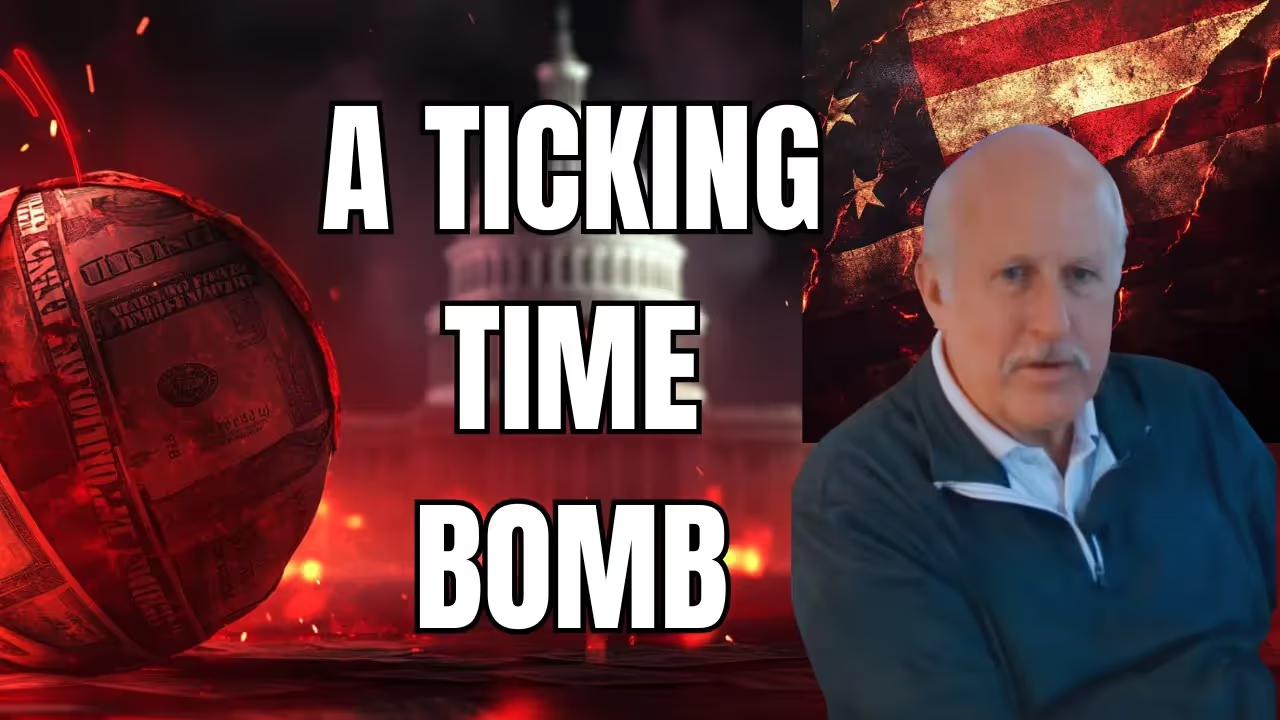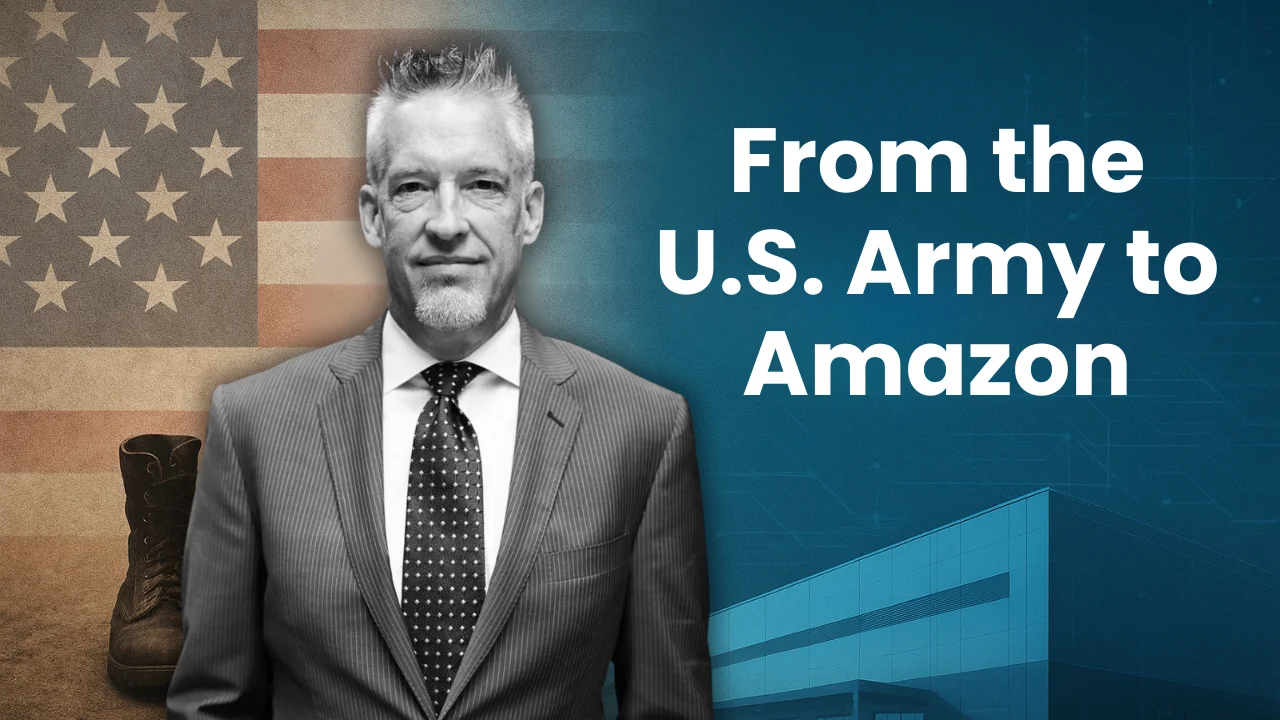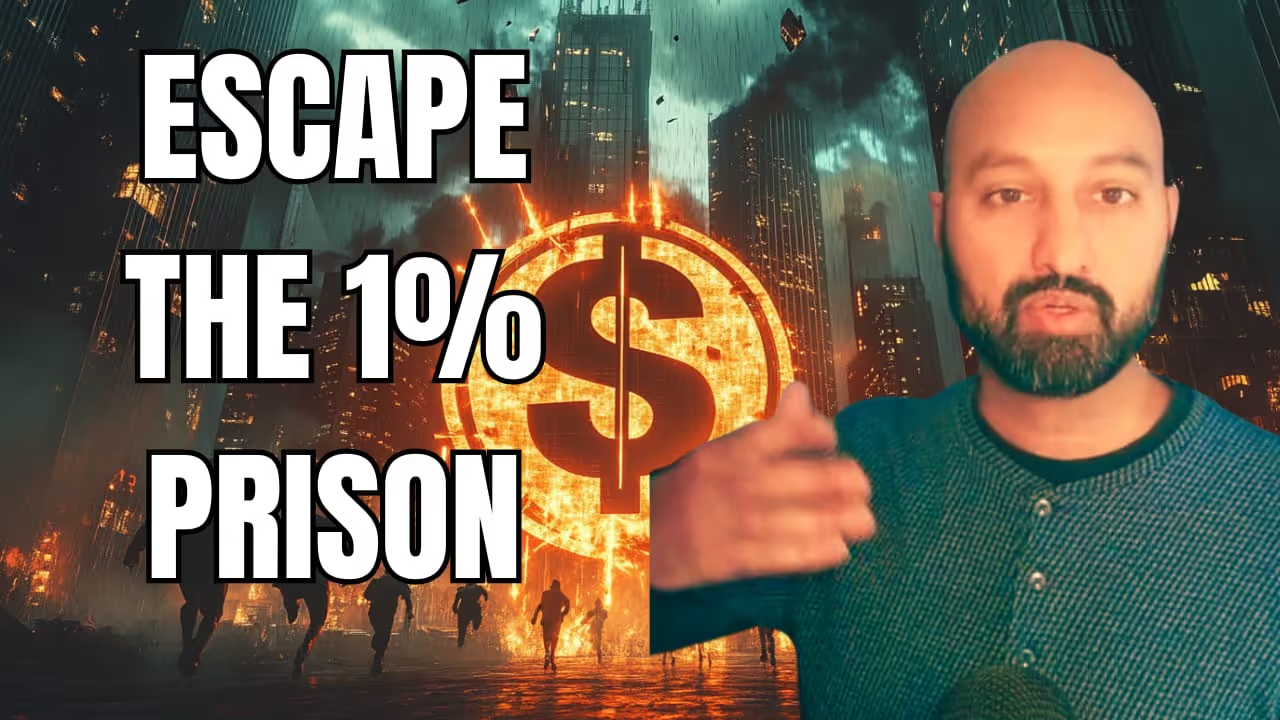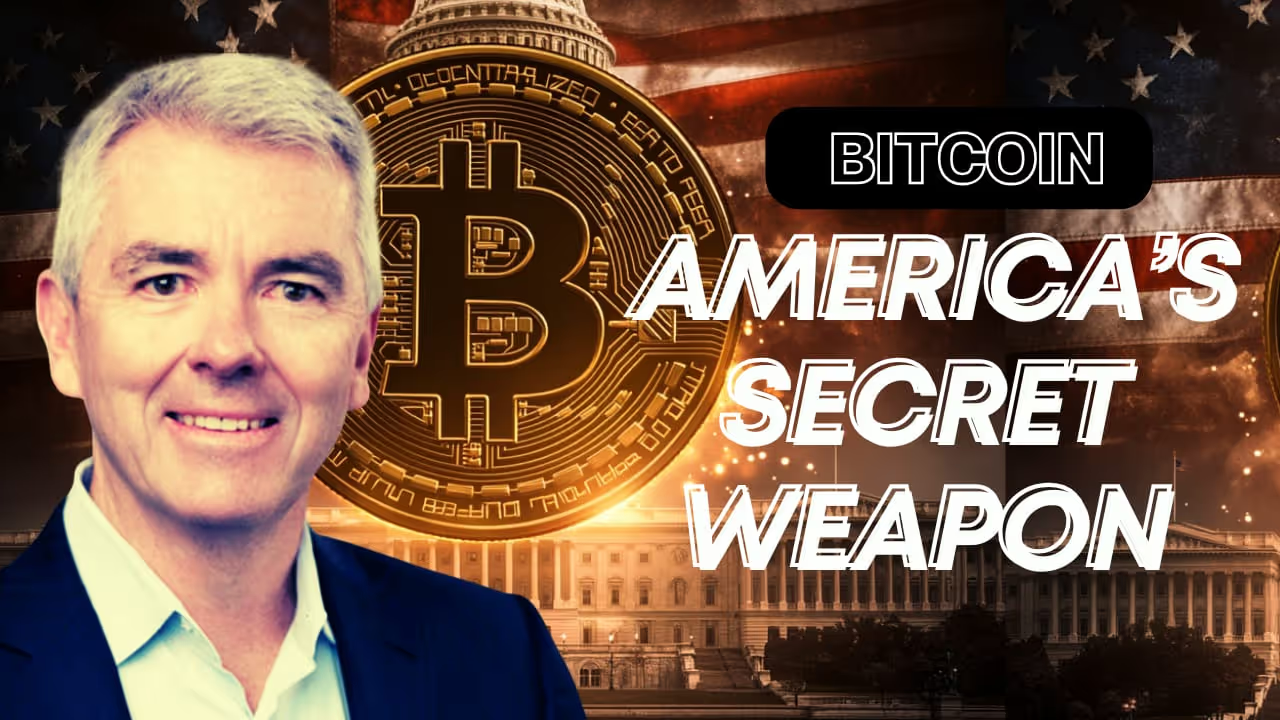Subscribe to MacroMashup News
Summary + Key Takeaways:
- David Walker clarifies his former role as Comptroller General (not Comptroller of the Currency) and explains the fiscal audit functions of the GAO. [00:01:40] to [00:04:25]
- He warns about the growing debt-to-GDP ratio and the rising disinterest of foreign bond buyers like China and Japan. [00:06:15] to [00:09:05]
- Discusses the potential global shift toward hard money and the risks of the BRICS introducing a new gold-backed reserve currency. [00:14:20] to [00:17:40]
- Emphasizes the need for: [00:18:00] to [00:22:55]
- Spending reform in social programs (Social Security, Medicare, Medicaid)
- Tax system overhaul
- Statutory fiscal sustainability commissions
- A Constitutional amendment to cap national debt levels relative to GDP
- Shares historical context on U.S. fiscal policy and the last time the budget was truly balanced. [00:11:50] to [00:13:40]
- Offers a sobering view on the limits of the Federal Reserve and why monetary tools can’t fix fiscal irresponsibility. [00:23:10] to [00:25:05]
- Makes the case for civic engagement and grassroots pressure to demand fiscal change. [00:26:25] to [00:28:15]
Transcript
[00:00:00]
David Walker, welcome to the Macro Mashup Podcast. We're very fortunate to have you with us today. David has the has a distinction of having been the controller of the currency during the only, I think, administration where we've balanced the budget in recent memory. And since then it's been one direction only.
I think, there's a ton of things to cover today. There's the bond market, there's government spending. There's, I. The Fed and the role of the Fed and whether they can intervene. There's, vibe shifts about the whole US economy and then whether we're, whether we're moving towards a hard money era.
So why don't we [00:01:00] start, because it's such a big deal. Why don't we start with the bond market, David? Did this administration just break the bond market? It's good to be with you. Thanks for the opportunity. Let me clarify one thing up upfront. I was the controller general of the United States rather than the control of the currency.
And the significance is the controller general, in effect is the auditor general, the key. The Chief Accountability Officer of the United States and the CEO of the Government Accountability Office, it's actually more important, frankly, than the control of the currency. But that's, sorry about that.
No, but you are correct in saying that. I'm the last controller general to serve for a president who actually balanced the budget. The first four years that I was controller General of the United States we actually had something called a surplus. People don't really know what that is.
Okay. And two of the four years we actually. Paid down debt help by the public those days are gone. And I [00:02:00] served for about 10 years in that position. And I'm sad to say that since I left in 2008 things have gone straight downhill. So let's start with the bond market. We got some warning signs last week when there were challenges associated with our latest bond auction, and we had to end up paying about 45 basis points.
Higher than expected in order to be able to sell the bonds that we needed to sell. I think people are very nervous right now primarily because of the tariffs. I think the approach that President Trump is taking with regard to tariffs, allegedly, he says that they are reciprocal tariffs, but in reality they're not.
They're much worse than reciprocal tariffs. He's backed off of some of his initial proposals. He's delayed. Most of the proposed increases for 90 days to give time to be able to negotiate. There are lots of warning signs going off. We're running $2 trillion deficits a year. [00:03:00] Debt to GDP is going up instead of down.
We have a reduced appetite on behalf of some of our historical bond buyers for our debt China, Japan. OPEC nations. In addition to that, we've got the bricks are expanding and are looking at the possibility of creating an alternative reserve currency. Back 40% by gold and 60% by basket of other currencies.
So there are a number of things going on that quite frankly, our leaders should be taking more seriously than they evidently are. And in terms of the the seriousness of that situation, we had a really crazy, calendar of events taking place that day. 'cause you had the bond market coming up then clearly I.
Somebody had spoken to Trump in advance of that and he said, it'd be cool. It's a great time to buy. Presumably that's not on any recorded line anywhere. And then, you had a successful auction, [00:04:00] presumably based on somebody telling the bond market, don't worry, we got your back. It's all gonna be good.
And then Trump came out with this nine 90 day pause and the market just. It ripped at that point. Now, it, it sold off again the next day. It was clearly an opportunity for people to get outta the market if they wanted to. But now we've had. This strange correlation break where the 10 year yield has gone up at the same time as the US dollar has gotten weaker, which is not something that usually happens.
So I'd love to hear your thoughts on that. My personal view, and I've said this publicly for a number of years, that the United States has been abusing its position as the world leading re reserve currency. We've gone from about 70% of international trade sent transactions down to about 58%. As I mentioned [00:05:00] before, there's a number of different warning signs that are going off.
No country is exempt from the laws of prudent finance, even the United States. We are not demonstrating to the world that we are gonna take the tough but necessary changes that are to be able to get control of our mounting debt burdens. In fact the house budget the house budget proposal makes things worse, not better.
The Senate is even worse than that. The house passed the Senate version primarily not because they liked the Senate version, but they wanted to get what's called our budget reconciliation process going so they could start negotiating and try to come up with a bill that could pass both houses. As you may know, a budget reconciliation is important in our country because the Senate can't filibuster budget reconciliation.
Otherwise, you need 60 votes. You just need a simple majority. And with the mar, the margins being as close as they are in the [00:06:00] Senate 53 47 you might not get over the hump if you have to have 60 votes. Bottom line we're in a challenging time. There's a lot of uncertainty.
With uncertainty creates volatility with uncertainty creates opportunity. But it also causes others to look for alternative arrangements. And so we'll see how the dust settles over the next few months. I, there've been discussions about some, let's say lateral thinking ways to get outta this situation such as.
Revaluing the goal that we have on our balance sheet as a country to create a sort of a realization of an unrealized gain that would then go into the Treasury general account and allow us to pay down some of that debt. Do you see, I know Scott Bessant has said he's not gonna do that, which is.
When never believe that something's gonna happen until the government denies it. But what do you think about that? I don't think there's any [00:07:00] panacea. And I think that we actually are eventually gonna have to make some tough choices. I. With regard to spending spending is too high.
It's 25% of GDP and headed higher. We're also gonna have to make some tough spending decisions with regard to revenues or revenues are a little bit below the post World War II averages as a percentage of GDP. The gap between spending and revenues is growing. Now, the elected officials are talking about extending.
Existing tax cuts and potentially adding new tax cuts without nearly enough spending reductions to be able to offset those different things. Look, we're never going back to the gold standard for lots of different reasons. Trying to be able to come up with one time gains as a way to solve a systemic problem is not something that in my view should be given seriously.
Okay fair enough. Since you mentioned government spending and the, the 25% of GDP that is essentially [00:08:00] propping up our GDP in a big way at the moment. How, and I know that, the reconciliation bill is thinking of all sorts of things and the Republicans are trying to convince people that they should, do some dynamic scoring of, which is.
Trying somehow to monetize in budget calculations, some views about what's gonna happen when you do certain things. But at 25% of GDP, how can we cut that without actually putting us into a recession? Several things. One the Republicans are talking about several things. They're talking about current policy rather than current law.
In, in doing budget scoring, the significance of that is current policy would assume that the tax cuts would not be allowed to expire, and therefore you don't have to count the cost associated with extending them, if you will. They're also talking about. Dynamic scoring. And it's one thing to do dynamic scoring as an illustration of what could [00:09:00] happen under different scenarios.
But if you're gonna do dynamic scoring, you need to do it both for revenues and investments on the spending side, if you will, not just one side of the ledger or the other. But here's the bottom line. We have something going on right now called Doge the Department of Government Efficiency, which is not a department.
It is, it is looking for alleged fraud, waste, abuse, or mismanagement to be able to cut spending. They're going about something that's necessary. The way they're going about it is a problem and they're not saving, but a small fraction of what they claim they're saving. And so therefore, while they can help make a modest reduction in federal spending, ultimately what we're gonna have to do is to make tough choices with regard to our social insurance programs that Social security, Medicare, Medicaid, we're gonna have to reprioritize and reduce discretionary spending over time.
Including defense spending. There's a lot of waste in defense. I'm on the Defense business board, so I can tell you [00:10:00] that. And we're gonna have to have more revenues as a percentage of GDP. We're gonna have to reform our tax system to make it simpler, fairer, more competitive, more enforceable, where more people are paying something the wealthy is paying more while still staying competitive on the global scale with regard to our corporate tax system.
These are all things we're gonna have. And then the question is. How do you get it done and how do you sustain it? Two things. We're gonna have to have a statutory fiscal sustainability commission that engages the American people with the facts of the truth of tough choices. Tills the ground, sets the table for a tough vote where everything's on the table, not everything's equal, but everything's on the table to get debt to GDP down to a reasonable sustainable level over the next 10 to 15 years.
And secondly, we're gonna have to amend our constitution. To put a limit on how much debt as percentage the economy we can take on other countries have done it. Switzerland's done it. Germany's done it. Sweden's [00:11:00] done it. The only thing that combine current and future congresses. Is a constitutional amendment and I'm working on all these things and more.
No I'm aware that you have been making a lot of progress regarding balanced budget, a amendments and working with the states to try and do that. Could you explain to the listeners a little bit about that initiative? We're looking for a fiscal responsibility amendment rather than a balanced budget amendment.
And there's several reasons for that. I believe that the most important metric is debt as a percentage of the economy. Not all debt is bad. Sometimes you have to take on debt. If you're in a war situation or serious recession or a pandemic or whatever, but too much debt. Is not acceptable and we're too high now and we're headed much higher.
Debt to GDP is also something I think can gain bipartisan support because it's pro-growth. If you grow the denominator faster than the numerator, you're making progress. Even if the numerator's going up, it says you [00:12:00] have to solve the problem, but it doesn't say how. It doesn't say how much of it is reducing mandatory spending, discretionary spending, and how much of it is generating additional revenue.
So that approach, I think. Makes the most sense and is also the most politically feasible. We have two ways to get a constitutional amendment in the United States under Article five of our Constitution, the old fashioned way, two thirds of the house, two thirds of the Senate passed something. Three quarters of the states have to ratify it.
We've had 27 amendments. They've all been done that way. But our nation's founders were very smart people. They recognized that at some point in time in the future, Congress might become so out of touch and so out of control, or that there could be certain issues where they had a fundamental conflict of interest re restoring fiscal sustainability by cutting spending and eliminating mounting debt burdens, like term limits, like campaign finance, that the state should have the right.
To propose one or more amendments through a convention of [00:13:00] states to propose amendments, not to rewrite the Constitution. And myself and a few other people have discovered that we had enough states that met that trigger, which is two thirds of the states in 1979, reached a peak in 1983. Congress never did anything.
And so now the Federal Fiscal Sustainability Foundation, which I chair is working with state attorney generals and certain legislatures to get them to sue the Congress for failure to call a convention. I believe the states would propose a meaningful amendment that would be focused primarily on debt to GDP, but could include some other things as well and that the people.
Would ratify it. There's two ways to ratify. One is the state legislatures and the other one is convention of delegates in each state pledged to vote for against the amendment. That's what was done to repeal prohibition. That [00:14:00] is the closest thing you can get in our country to a referendum of the people, and that's what I think we need.
I mean that a couple of things that you said suggest engaging with the electorate in a way that is not familiar to people in the recent past. To actually take it to the people to try and generate some some groundswell of support for this. How do you. Communicate this kind of important initiative to people.
It's it's a huge undertaking, right? It is. But there are plenty of ways to do it today that didn't exist 10, 20 years ago. Now you have social media, you have. A variety of different outlets with regard to electronic media. And I've got direct experience doing this.
I've done citizen education engagement in 47 states, plus two [00:15:00] territories, plus several countries. In 2012. I did a 10,000 mile, 27 state national fiscal responsibility tour. I had special events with demographically representative groups of voters and we achieved 77 to 97% support on specific reforms to taxes, social security, Medicare, Medicaid, healthcare defense.
Operations and political reforms. The people are way ahead of the politicians. The answer is the first three words of the Constitution. We the people. And that's why I feel so strongly that you've gotta have a statutory commission who is charged with citizen education engagement and then will set the table for a tough vote so that people won't automatically lose their job because the people I.
Would've been brought up to date and would show that they're willing to [00:16:00] accept tough choices if they're part of a comprehensive goal-based plan, consistent with principles and values that bring people together rather than divide them apart. And it's a it's a fascinating idea because the, we've.
Become accustomed to thinking that political leaders are really what it's all about, right? They have become the focus of everybody's attention. And at the same time. I think it's fair to say that if you're gonna be a truly successful politician and I know that you have, you've made some runs in that area, you you wear the masks that, that you think your electorate wants to see.
And certainly we have evidence that's very much the case at the moment. But there, there is a really strong sense that people are, saying some things very loudly to the political establishment that they want to have them pay [00:17:00] attention to. And that message may not always get to the, to the political suite in the right way.
But clearly people are speaking up there. There are some things that, in this sort of post Bretton Woods era where things have gone in a particular direction and you now have. 140 trillion of wealth, which is not evenly distributed by any means and is creating some problems because, the people who are invested in and care about the stock market may be a relatively small percentage of the population.
Those who aren't have very different motivations from those that do. So this whole. Trend outta neoliberalism into populism is a very marked trend and does suggest that people have a lot to say about how they want things to operate in the country. So maybe that, this is a time when the [00:18:00] initiative that you are, that you've described to us can some traction.
One of the things that. That concerns me is that, that people have become. Far too focused on some of the instrumentalities, such as, the Federal Reserve as being the primary focus of everything that goes on in daily lives. People hang on every word that Jay Powell says, or whoever is in that seat at the time.
What the Fed has to say about anything in particular is now incredibly important. And yet. There is evidence that maybe the Fed doesn't have the room to move. That it used to have, that it's in a sense, trapped by the fiscal situation that we have found ourselves in. And I'd be interested to hear, for the listeners what your thoughts on that are.
Several things. One, the Fed now has [00:19:00] three. Missions or number one to promote economic growth. With that growth comes opportunity. Okay. Secondly, to maintain stable prices and thirdly, to try to help achieve full employment. In my view, it's number one mission should be to promote stable prices.
Because only it is in the position to really have a major impact on that. Yes, I wanted to do things that help to promote macroeconomic growth. Alright. And it can help in that regard. At the same point in time, I don't think it should be involved in the full employment area at all because if you promote macroeconomic growth.
If you maintain stable prices, you will have an environment that will help with regard to achieving your full employment. But the real challenge with regard to full employment has to do with our education system, has to do with our immigration system, has to do with our [00:20:00] regulatory policy, has to do with our tax system, and the Fed has nothing to do with that at all.
That's the Congress. The second point that I would make is that. Several fed chairs in a row have said that they're getting boxed in. And they've said publicly that the United States is on an irresponsible and unsustainable fiscal path. They might have not used the words that I did, but they basically are saying that fiscal policy is outta control.
And that congress needs con get control of fiscal policy and that their tools are being. More limited now than what they've had in the past. In part because of fiscal responsibility. So not only the Fed, but the Government Accountability Office, which I ran, the Office of Management and Budget, which is at the executive branch, the Congressional Budget Office.
The Treasury Department have all said the same thing. My question is, [00:21:00] when are they gonna start acting on it? Everybody knows that we're on an imprudent and unsustainable path. There are all kinds of warning signs going off. It's time to start acting. And by the way, most politicians today, and there are exceptions, are laggards, not leaders, and they've forgotten a word that is key to our success.
In the past, it's called stewardship, and even in our constitution. It talks about not just generating positive results today, but for our posterity, which means that as leaders, we're not just supposed to generate positive results today. Not just leave things better off when we leave than when we came, but better positioned for the future.
And that is not happening right now. And that's irresponsible. It is unethical. It is immoral, and it must stop. [00:22:00] No, you may you make a great point. It's it's very, so sometimes I think the position we've got into is where you see that the Fed reserve chair sitting there with with a whole suite of dials in front of him or her.
And it's okay, which one are we going to turn? We're gonna turn this a little bit, we're gonna turn that one a little bit. And then we're gonna pull this lever a little bit and that should be good. And then the economy is gonna be adjusted, tweaked and on the right footing. That, that seems to be the position that we find ourselves in.
But when you see things happen such as, the Fed lowering the short end and then the 10 year continuing to go up, it makes you wonder whether they really. Whether they shouldn't just leave the whole issue of interest rates to the market and, go about their business in a different way.
Some people have even [00:23:00] suggested that we don't need the Federal Reserve to do what it's doing at the moment. What do you think about that? I sure don't want Congress to do, have any additional responsibility with regard to monetary policy, that's for sure. I would've to think about what the ramifications and the alternatives would be, but as I said, I know for sure I would not want Congress to have more responsibility.
They can't even handle fiscal policy when you said earlier that I also don't want Congress to be setting accounting standards because how you keep score matters and accounting is how you keep score. And quite frankly, we need modifications in that. Situation too, because our situation is actually worse than advertised.
W what? What sort of things do you have in mind that we might amend in accounting terms? Several things. Okay. We have several trillion dollars of bonds that are held by the Social Security and Medicare and other trust funds that are [00:24:00] guaranteed by the full faith and credit of the United States government, both as the principal and interest that are guaranteed.
By the Constitution of the United States and we don't show 'em as liabilities. That's the first thing. Sec. That's the difference between debt held by the public and debt subject to the debt ceiling limit. It's about $7 trillion. Alright secondly we also, I think, should have a double bottom line on our balance sheet.
The first one that shows assets and liabilities and the difference there. And the second one that shows assets, liabilities, and unfunded obligations, which are much greater than liabilities. We add another $90 trillion in unfunded social security, Medicare obligations. And so the, the whole is much deeper than being advertised.
We also need additional disclosures. One example is we issue $1.9 trillion. In, in or lose $1.9 trillion [00:25:00] in revenues every year due to tax preferences, deductions, exemptions, credits, exclusions. They're in effect backdoor spending. And yet we have little to no disclosures in the financial statements about what those are.
So those are just a few examples, if you will. You, we need a fuller and fairer view. Of where we are and where we're headed. We've made progress in recent years, a lot of which was under my tenure, where we ended up having, long range projections where we ended up providing more information on social insurance programs, et cetera.
But there's still a ways to go. I. I, it, there's something that I've enjoyed actually as a really informative source, is the initiative that Steve Bauer know former CEO of put together us a facts. Yeah. Tremendous source of information. I. It is, you need to put it in a more digestible format, I think.
And in fact, myself and someone else that I'm working with right now are gonna try to talk to Steve about another [00:26:00] initiative. Lemme give you an example, something you would be shocked by. United States has been in business since 1789. It still does not have a strategic framework. It still does not have key outcome-based indicators about what it's trying to do and how do you measure success?
So as a result, it's flying blind and growing mountains of debt without an instrument panel. No wonder we're not doing well. And by the way, when you're in that kind of situation, the only thing you can do is throw more money or throw more tax preferences or something. But on the other hand, you don't know whether they work or not because you're not measuring.
Outcomes and outcomes are what matter.
May maybe now would be a good point to pivot a little bit towards what what I mentioned earlier, whether there is, as a result of all the trends that we have in the irresponsible fiscal position, we've put ourselves in. And [00:27:00] the lack of a will to get ourselves out of it.
Whether there's beginning to be a bit of a loss of faith in the position that the US holds at the center of this sort of geopolitical and economic realm, which we've had since Bretton Woods. I'm concerned because we were seeing a number of different signals. Where people are starting to lose confidence in the United States in certain regards.
One of which, as I said, is our inability to put our finances in order and our increasing reliance on on financing those deficits, if you will. Another of which is a current tariff situation. It's one thing to talk about reciprocal tariffs. It's another thing to talk about tariffs that are multiple times reciprocity and not having a clear, clearly defined, consistently applied and transparent criteria for what you're trying [00:28:00] to do and how do you measure success?
And so I for a number of different reasons I'm concerned that we need to provide more stability. And more certainty not just with regard to our finances, but also with regard to our trade policies with regard to our commitment to various alliances around the world. Because I don't want us to lose the position of being the leading superpower, not the only superpower, but the leading superpower in the world.
Things have changed a lot since World War ii. At the end of World War ii, we were 50% of global GDP. The dollar was as good as gold and, today, we're a little over 25% of global GDP based on nominal dollars. We're number two on purchasing power parity to China. The dollar clearly is not as good as gold.
And and there are flashing warning signs going off that [00:29:00] I don't believe that our elected officials. Are taking seriously enough. I think that's a great, that's a great point. And if you look at the situation that we're in, you mentioned China and our relative position to China, in, in terms of who has the leverage.
As regards tariffs. I think there is a perception that we have the biggest market that everybody wants to be having access to our market and that we have all the power, but in, in reality that may be different because China is a third of global manufacturing. Our supply lines are so incredibly inextricably linked with China, and if they shut down.
The export market to the US for a while, they could just pump up their domestic demand to make up for that, and they would be by and large, fine for us. I'm not sure that the position is so benign because as a major importer of everything that China has been [00:30:00] exporting there are some real problems for us if we don't have access to that flow of goods in, into the us.
And there are two areas in particular that I'm concerned about. Rare earth minerals, which we are unduly dependent upon China and other materials that are necessary to make prescription drugs. We do for national security reasons, need to make sure that we're self-sufficient with regard to certain industries.
We've offshore too much over the last several decades. But it's gonna take a while before we can reshore it. You don't just flip a switch. One example is chips. We're very dependent upon Taiwan for high, high end semiconductors. The chips has PA chips, acts act past. We're now trying to develop more capacity in the United States, but that's gonna take years.
For that to happen. And frankly, one of the other things that I'm concerned about is if relations between [00:31:00] China and the United States deteriorate too much China might decide to make a move on Taiwan. And and I think if they were gonna make a move, in my view, it would be an embargo, not an invasion.
But that would not only hurt the United States, it would hurt many other countries that are unduly relying upon Taiwan for semiconductors. And it also would create challenges with regard to supply chains because a majority of the world's goods move through the South China Sea. I think that's a concern.
Certainly I've had, previous guests on this podcast talking about the fact that we are. In embarked upon World War III with China because that's the, that's China's motivation in terms of its geopolitical position is, its economy is not great. And it does it, it almost has to take some aggressive measures to shore [00:32:00] up its position at this point and to capitalize on the weakness that it clearly perceives exists in the us.
Fiscal situation when, they hold so much of our debt, although they haven't been buying on net since 2014. I think they have a lot of their assets from those trade surpluses. Recycled into our stock market not just the, the bond market. And if we're chasing them outta those markets, that's gonna have implications for our stock markets as, as well.
But I, one, one thing I think it, it would be great for you to give your thoughts on is since we sanctioned. Russia's reserves when they invaded Ukraine. There's been a marked uptick in the amount of gold that central banks have been buying. There's been a really large flow of actual physical gold out of London, into Asia.
A lot of that going to China. Because [00:33:00] presumably they concluded if we could do that to Russia's FX reserves, if you get on the wrong side of the us, they, they just might do that to anybody that gets on the wrong side of the us so gold has been, rocketing up in, in price as a result of that.
Are we seeing a pivot back toward a more hard money world and the developments of a more neutral reserve asset other than the US dollar? Yes, I think so. I think the United States is losing market share. I with regard to reserve currency status I'm not saying we're not, I'm not saying we're gonna lose reserve currency status, but we're losing market share.
We've gone from 70% a couple of decades ago down to 58. We've talked about a number of things that are going on that could cause us to lose more market share. The other thing you have to keep in mind is, as I mentioned before. The bricks are looking at the possibility of creating an alternative reserve currency that would be back 40% by [00:34:00] goal, which is one of the reasons why China may be accumulating additional goal and and 60% by a basket of other currencies.
You're also seeing things where, you know Saudi Arabia used to only trade in dollars, but now they're trading. Other currencies as well. So they're, just, these are just a few examples of the warning signs that I don't believe our elected officials are taking seriously enough. We have too many laggards and not enough leaders in politics.
No I would I would agree with that. And I think the UK has a similar. Problem actually. You're going through a challenging period too that, that, that's for sure. But it is, it, is it necessarily a bad thing if we do move towards a more neutral reserve asset? In some respects it is.
We we've thought of the US dollar being the reserve. Asset as [00:35:00] being an exorbitant privilege. And it does mean that, we can continue to print and so on. But is it a, is it necessarily a bad thing if the US doesn't have preeminence for the dollar? It's not a necessarily a bad thing for the world.
It's obviously something that we would have to adjust to because by being the primary reserve currency we can borrow at lower cost. We have trade advantages that come with that. And we have the ability to impose economic sanctions as a result of that as well. And frankly, that's one of the things that the Bris nations don't like.
I. And by the way, it's not just the United States, it's the west the United States is maybe the tip of the spear with regard to, the reason that certain actions are being taken. But it's, there are major cultural differences as well that come to play here. Yes, I agree on the interest rates, except that I [00:36:00] think China's borrowing more cheaply than the US right now.
So you know why. Yeah. It's, it is def it is definitely it is definitely not necessarily the way that, that we that we would like it to go, but I wanted to just I'm aware that we're I don't wanna take up too much of your time here, but. For the benefit of the listeners.
You have written a couple of books, right? And you've put some of this learning down in written form that, that people can get hold of. Just spend a couple of minutes telling us what it is that you, I mean I've been through, I've been through those publications. But if you could give people a sense and also give them a sense of whether there's anything more.
That they should expect from from you in the near future? I've written four books and three of 'em were published by major publishers. One was a national bestseller. It was called Comeback America, that was published in 2010. But my latest book I self-published 'cause I wasn't looking to make money on it.[00:37:00]
I wrote it because I taught at the US Naval Academy for two years, the economics of National Security. I had to create the course from scratch, and after teaching it for a year, I said, I might as well write a book about this. Not a te, not an academic textbook, but one that dealt with national security, economic security, domestic tranquility, and other issues.
It's called America in 2040 Colon. Still a superpower. Mark lessons from history, lessons from others challenges that we face, and potential solutions as to how do we address those challenges including the results of that tour that I mentioned before, the 10,000 mile 27 state tour where we got seven, seven to 97% agreement from representative groups of American voters on.
A way forward to try to diffuse our debt bomb. And quite frankly, the book was originally issued in September of 2020. I updated it in [00:38:00] February of 2024, and it's proven to be pretty prophetic, including things, some of the things that we're talking about as well as Russia's incursion into Ukraine is something that I predicted was going to happen.
And, you can find out more about it as well as a number of other op-eds that I've written and various other things@americaintwenty.com.
I'm going to link those resources when, when we post the podcast. It would be great. And I know it's a, I had somebody ask me this question this morning. I was on a, a radio show with some great young people from. From Hofstra. They have a radio station and Right.
So it was a 15 minute segment and they was like so if you were in charge, if you were king right now, what would you do? So I'm gonna ask you the same question. Let's focus on the fiscal issue. [00:39:00] Okay. The, there are three things that need to happen in order to restore. Economy, efficiency, effectiveness, and sustainability in the United States.
Okay number one, doge, as I mentioned at best, is gonna make a modest down payment in reducing spending at best. And so what we need is we need an effort. To develop a strategic framework of here's what we're trying to accomplish as a federal government. Here's how we're gonna measure success based on outcomes.
And then to go about restructuring the federal government based on that, much more dramatic, much more transformational much, much more savings and much more improvement with regard to what the government does, how government does it, if you will. Secondly, we've gotta have that statutory commission.
I would advocate for that and push for passage of that. And thirdly we gotta have a constitutional amendment. Now the president actually has no role on constitutional amendments other than the ability to use the [00:40:00] bully pulpit to try to get people to do things that. We need to do. And so those are the three big things that I would do.
Okay. There are other things on other issues but those, but on the fiscal issue, those are the three big things that we need to do. And I'm trying to work on all three right now. And do you think there are any voices out there, any leaders or would be leaders who are saying some of the things that are resonating with you?
Ray Dalio, who you know as runs one of the big hedge funds in the world is speaking out on this issue. Jamie Diamond has spoken out on this issue. Warren Buffet occasionally has spoken out on this issue. As we've said, the, the Federal Reserve chairs and, every major fiscal agency in the federal government has spoken out on this issue. But only the president is elected by all the people. Only the president has the bully pulpit. And so the [00:41:00] president has the disproportionate opportunity and obligation to lead on things like this. And I'm hoping that he will.
Okay. That is probably as good a place as any that we could draw a line under this. And I thank you so much for giving your time. It's fascinating to me to hear what you have to say. Because it's so current, I find so many people these days that these issues are. At the forefront of their thinking because they see so many of the problems.
And it's not just a remote thing. It, it impacts their lives daily. It's in the news cycle daily. So these are very important issues. And I appreciate you coming on and spending the time to do this. Thank you very much. Happy to do it. Bye bye.
[00:42:00]
.svg)
.svg)
.svg)


.avif)






.svg)
.svg)
